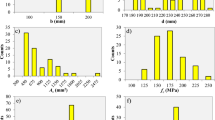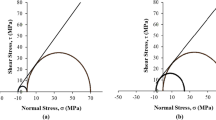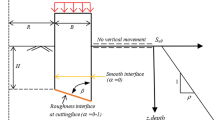Abstract
Splitting tensile strength is one of the commonly used mechanical properties in the design of high-performance concrete (HPC) structures. To achieve accurate prediction of splitting tensile strength of HPC, two optimized machine learning models GA-ANN and GS-SVR were employed to predict the target tensile strength on 714 sets of sample data with 12 features of HPC as input variables. The appropriate initial weights and thresholds of the ANN model and hyper-parameters of the SVR model were first obtained by genetic algorithm and grid search, respectively. Then, the optimized models were used to train and test the dataset, and the performance of the models was evaluated and compared using evaluation metrics. The results showed that the prediction accuracy of the optimized GA-ANN model was higher than that of the pre-optimized ANN model, but still inferior to that of the GS-SVR model. Compared with the known machine learning models in the literature, the GS-SVR model proposed in this paper has smaller prediction error, higher prediction accuracy, and better performance. The strong generalization ability of the GS-SVR model to unseen test data indicates its great potential in predicting the tensile strength and is recommended as an alternative method for splitting tensile strength prediction of HPC. Additionally, a parametric analysis based on the Shapley additive explanations approach (SHAP) was proposed to investigate the importance and contribution of these input variables on the output splitting tensile strength.












Similar content being viewed by others
Data Availability
Not applicable.
References
Al-Shamiri AK, Kim JH, Yuan T-F, Yoon YS (2019) Modeling the compressive strength of high-strength concrete: an extreme learning approach. Constr Build Mater 208:204–219. https://doi.org/10.1016/j.conbuildmat.2019.02.165
Alavi AH, Ameri M, Gandomi AH, Mirzahosseini MR (2011) Formulation of flow number of asphalt mixes using a hybrid computational method. Constr Build Mater 25:1338–1355. https://doi.org/10.1016/j.conbuildmat.2010.09.010
Armaghani DJ, Asteris PG (2021) A comparative study of ANN and ANFIS models for the prediction of cement-based mortar materials compressive strength. Neural Comput & Applic 33:4501–4532. https://doi.org/10.1007/s00521-020-05244-4
Bin Ahmed F, Abid Ahsan K, Shariff T, Rahman Meem S (2021) Formulation of polynomial equation predicting the splitting tensile strength of concrete. Mater Today: Proc 38:3269–3278. https://doi.org/10.1016/j.matpr.2020.10.017
Biswas RK, Iwanami M, Chijiwa N, Uno K (2020) Effect of non-uniform rebar corrosion on structural performance of RC structures: a numerical and experimental investigation. Constr Build Mater 230:116908. https://doi.org/10.1016/j.conbuildmat.2019.116908
Bui D-K, Nguyen T, Chou J-S, Nguyen-Xuan H, Ngo TD (2018) A modified firefly algorithm-artificial neural network expert system for predicting compressive and tensile strength of high-performance concrete. Constr Build Mater 180:320–333. https://doi.org/10.1016/j.conbuildmat.2018.05.201
Chen H, Li X, Wu Y, Zuo L, Lu M, Zhou Y (2022) Compressive strength prediction of high-strength concrete using long short-term memory and machine learning algorithms. Buildings-Basel 12. https://doi.org/10.3390/buildings12030302
Chithra S, Kumar SRRS, Chinnaraju K, Alfin Ashmita F (2016) A comparative study on the compressive strength prediction models for high performance concrete containing nano silica and copper slag using regression analysis and artificial neural networks. Constr Build Mater 114:528–535. https://doi.org/10.1016/j.conbuildmat.2016.03.214
Chou J-S, Tsai C-F, Pham A-D, Lu Y-H (2014) Machine learning in concrete strength simulations: multi-nation data analytics. Constr Build Mater 73:771–780. https://doi.org/10.1016/j.conbuildmat.2014.09.054
Du J, Meng W, Khayat KH, Bao Y, Guo P, Lyu Z, Abu-obeidah A, Nassif H, Wang H (2021) New development of ultra-high-performance concrete (UHPC). Compos Part B 224:109220. https://doi.org/10.1016/j.compositesb.2021.109220
Erdal HI, Karakurt O, Namli E (2013) High performance concrete compressive strength forecasting using ensemble models based on discrete wavelet transform. Eng Appl Artif Intell 26:1246–1254. https://doi.org/10.1016/j.engappai.2012.10.014
Farooq F, Ahmed W, Akbar A, Aslam F, Alyousef R (2021) Predictive modeling for sustainable high-performance concrete from industrial wastes: a comparison and optimization of models using ensemble learners. J Clean Prod 292:126032. https://doi.org/10.1016/j.jclepro.2021.126032
Feng D-C, Liu Z-T, Wang X-D, Chen Y, Chang J-Q, Wei D-F, Jiang Z-M (2020) Machine learning-based compressive strength prediction for concrete: an adaptive boosting approach. Constr Build Mater 230:117000. https://doi.org/10.1016/j.conbuildmat.2019.117000
Francis A, Oluokun EGB, Deatherage JH (1991) Splitting tensile strength and compressive strength relationships at early ages. ACI Mater J 88:115–121. https://doi.org/10.14359/1859
Gardner NJ (1990) Effect of temperature on the early-age properties of type I, type II, and type III/fly ash concretes with temperature. ACI Mater J 87:68–78. https://doi.org/10.14359/2381
Ghorbani B, Arulrajah A, Narsilio G, Horpibulsuk S (2020a) Experimental investigation and modelling the deformation properties of demolition wastes subjected to freeze–thaw cycles using ANN and SVR. Constr Build Mater 258:119688. https://doi.org/10.1016/j.conbuildmat.2020.119688
Ghorbani B, Arulrajah A, Narsilio G, Horpibulsuk S, Bo MW (2020b) Development of genetic-based models for predicting the resilient modulus of cohesive pavement subgrade soils. Soils Found 60:398–412. https://doi.org/10.1016/j.sandf.2020.02.010
Han B, Wu Y, Liu L (2022) Prediction and uncertainty quantification of compressive strength of high-strength concrete using optimized machine learning algorithms. Struct Concr. https://doi.org/10.1002/suco.202100732
Han Q, Gui C, Xu J, Lacidogna G (2019) A generalized method to predict the compressive strength of high-performance concrete by improved random forest algorithm. Constr Build Mater 226:734–742. https://doi.org/10.1016/j.conbuildmat.2019.07.315
Jiang W, Xie Y, Li W, Wu J, Long G (2021) Prediction of the splitting tensile strength of the bonding interface by combining the support vector machine with the particle swarm optimization algorithm. Eng Struct 230:111696. https://doi.org/10.1016/j.engstruct.2020.111696
Kadleček V, Modrý S, Kadleček V (2002) Size effect of test specimens on tensile splitting strength of concrete: general relation. Mater Struct 35:28. https://doi.org/10.1007/BF02482087
Kardani N, Zhou A, Nazem M, Shen S-L (2020) Estimation of bearing capacity of piles in cohesionless soil using optimised machine learning approaches. Geotech Geol Eng 38:2271–2291. https://doi.org/10.1007/s10706-019-01085-8
Karl W, Shashidhara M, Surendra PS (1996) Shrinkage cracking of high-strength concrete. ACI Mater J 93:409–415
Khan MI (2012) Predicting properties of high performance concrete containing composite cementitious materials using artificial neural networks. Autom Constr 22:516–524. https://doi.org/10.1016/j.autcon.2011.11.011
Kim JE, Park WS, Yun SH, Jang YI, Yun HD, Kim SW, Kim DG (2015) The relationship of compressive strength and tensile strength of high performance concrete. Key Eng Mater 627:385–388. https://doi.org/10.4028/www.scientific.net/KEM.627.385
Lan T, Hu H, Jiang C, Yang G, Zhao Z (2020) A comparative study of decision tree, random forest, and convolutional neural network for spread-F identification. Adv Space Res 65:2052–2061. https://doi.org/10.1016/j.asr.2020.01.036
Latif SD (2021a) Concrete compressive strength prediction modeling utilizing deep learning long short-term memory algorithm for a sustainable environment. Environ Sci Pollut Res 28:30294–30302. https://doi.org/10.1007/s11356-021-12877-y
Latif SD (2021b) Developing a boosted decision tree regression prediction model as a sustainable tool for compressive strength of environmentally friendly concrete. Environ Sci Pollut Res 28:65935–65944. https://doi.org/10.1007/s11356-021-15662-z
Li X, Zhang Y, Shi C, Chen X (2020) Experimental and numerical study on tensile strength and failure pattern of high performance steel fiber reinforced concrete under dynamic splitting tension. Constr Build Mater 259:119796. https://doi.org/10.1016/j.conbuildmat.2020.119796
Lim C-H, Yoon Y-S, Kim J-H (2004) Genetic algorithm in mix proportioning of high-performance concrete. Cem Concr Res 34:409–420. https://doi.org/10.1016/j.cemconres.2003.08.018
Milovancevic M, Denić N, Ćirković B, Nešić Z, Paunović M, Stojanović J (2021) Prediction of shear debonding strength of concrete structure with high-performance fiber reinforced concrete. Structures 33:4475–4480. https://doi.org/10.1016/j.istruc.2021.07.012
Mohammad HR, Khushefati WH, Demirboga R, Hojjat A (2017) Supervised deep restricted Boltzmann machine for estimation of concrete. ACI Mater J 114:237–244. https://doi.org/10.14359/51689560
Neville A, Aïtcin P-C (1998) High performance concrete-an overview. Mater Struct 31:111–117. https://doi.org/10.1007/BF02486473
Nguyen H, Vu T, Vo TP, Thai H-T (2021a) Efficient machine learning models for prediction of concrete strengths. Constr Build Mater 266:120950. https://doi.org/10.1016/j.conbuildmat.2020.120950
Nguyen M-ST, Trinh M-C, Kim S-E (2021b) Uncertainty quantification of ultimate compressive strength of CCFST columns using hybrid machine learning model. Eng Comput. https://doi.org/10.1007/s00366-021-01339-1
O’Hegarty R, Kinnane O, Newell J, West R (2021) High performance, low carbon concrete for building cladding applications. J Build Eng 43:102566. https://doi.org/10.1016/j.jobe.2021.102566
Park WS, Kim JE, Eom NY, Kim SW, Kim DG, Cho MS (2013) Mechanical properties of high strength concrete using mineral admixtures. Appl Mech Mater 372:235–238. https://doi.org/10.4028/www.scientific.net/AMM.372.235
Pyo S, Kim H-K, Lee BY (2017) Effects of coarser fine aggregate on tensile properties of ultra high performance concrete. Cem Concr Compos 84:28–35. https://doi.org/10.1016/j.cemconcomp.2017.08.014
Ray S, Rahman MM, Haque M, Hasan MW, Alam MM (2021) Performance evaluation of SVM and GBM in predicting compressive and splitting tensile strength of concrete prepared with ceramic waste and nylon fiber. J King Saud Univ - Eng Sci. https://doi.org/10.1016/j.jksues.2021.02.009
Rostami MF, Sadrossadat E, Ghorbani B, Kazemi SM (2018) New empirical formulations for indirect estimation of peak-confined compressive strength and strain of circular RC columns using LGP method. Eng Comput 34:865–880. https://doi.org/10.1007/s00366-018-0577-7
Sadrossadat E, Ghorbani B, Oskooei R, Kaboutari M (2018) Use of adaptive neuro-fuzzy inference system and gene expression programming methods for estimation of the bearing capacity of rock foundations. Eng Comput 35:2078–2106. https://doi.org/10.1108/EC-07-2017-0258
Sarıdemir M (2011) Empirical modeling of splitting tensile strength from cylinder compressive strength of concrete by genetic programming. Expert Syst Appl 38:14257–14268. https://doi.org/10.1016/j.eswa.2011.04.239
Solhmirzaei R, Salehi H, Kodur V, Naser MZ (2020) Machine learning framework for predicting failure mode and shear capacity of ultra high performance concrete beams. Eng Struct 224:111221. https://doi.org/10.1016/j.engstruct.2020.111221
Tang F, Wu Y, Zhou Y (2022) Hybridizing grid search and support vector regression to predict the compressive strength of fly ash concrete. Adv Civil Eng 2022:3601914. https://doi.org/10.1155/2022/3601914
Wakjira TG, Ibrahim M, Ebead U, Alam MS (2022) Explainable machine learning model and reliability analysis for flexural capacity prediction of RC beams strengthened in flexure with FRCM. Eng Struct 255:113903. https://doi.org/10.1016/j.engstruct.2022.113903
Wetzel A, Middendorf B (2019) Influence of silica fume on properties of fresh and hardened ultra-high performance concrete based on alkali-activated slag. Cem Concr Compos 100:53–59. https://doi.org/10.1016/j.cemconcomp.2019.03.023
Wu Y, Li S (2022) Damage degree evaluation of masonry using optimized SVM-based acoustic emission monitoring and rate process theory. Measurement 190:110729. https://doi.org/10.1016/j.measurement.2022.110729
Wu Y, Zhou Y (2022) Hybrid machine learning model and Shapley additive explanations for compressive strength of sustainable concrete. Constr Build Mater 330:127298. https://doi.org/10.1016/j.conbuildmat.2022.127298
Yan K, Shi C (2010) Prediction of elastic modulus of normal and high strength concrete by support vector machine. Constr Build Mater 24:1479–1485. https://doi.org/10.1016/j.conbuildmat.2010.01.006
Yeh IC (1998) Modeling of strength of high-performance concrete using artificial neural networks. Cem Concr Res 28:1797–1808. https://doi.org/10.1016/S0008-8846(98)00165-3
Yin H, Shirai K, Teo W (2019) Finite element modelling to predict the flexural behaviour of ultra-high performance concrete members. Eng Struct 183:741–755. https://doi.org/10.1016/j.engstruct.2019.01.046
Zain MFM, Mahmud HB, Ilham A, Faizal M (2002) Prediction of splitting tensile strength of high-performance concrete. Cem Concr Res 32:1251–1258. https://doi.org/10.1016/S0008-8846(02)00768-8
Zhao S, Ding X, Zhao M, Li C, Pei S (2017a) Experimental study on tensile strength development of concrete with manufactured sand. Constr Build Mater 138:247–253. https://doi.org/10.1016/j.conbuildmat.2017.01.093
Zhao S, Hu F, Ding X, Zhao M, Li C, Pei S (2017b) Dataset of tensile strength development of concrete with manufactured sand. Data in Brief 11:469–472. https://doi.org/10.1016/j.dib.2017.02.043
Zhou Z, Qiao P (2019) Tensile behavior of ultra-high performance concrete: analytical model and experimental validation. Constr Build Mater 201:842–851. https://doi.org/10.1016/j.conbuildmat.2018.12.137
Zhu H, Wang Z, Xu J, Han Q (2019) Microporous structures and compressive strength of high-performance rubber concrete with internal curing agent. Constr Build Mater 215:128–134. https://doi.org/10.1016/j.conbuildmat.2019.04.184
Author information
Authors and Affiliations
Contributions
Yanqi Wu—methodology, visualization, writing-original draft, conceptualization, formal analysis; Yisong Zhou—validation, visualization, software
Corresponding author
Ethics declarations
Ethics approval
Not applicable.
Consent to participate
Not applicable.
Consent to publication
Not applicable.
Conflict of interest
The authors declare no competing interests.
Additional information
Responsible Editor: Philippe Garrigues
Publisher’s note
Springer Nature remains neutral with regard to jurisdictional claims in published maps and institutional affiliations.
Rights and permissions
About this article
Cite this article
Wu, Y., Zhou, Y. Splitting tensile strength prediction of sustainable high-performance concrete using machine learning techniques. Environ Sci Pollut Res 29, 89198–89209 (2022). https://doi.org/10.1007/s11356-022-22048-2
Received:
Accepted:
Published:
Issue Date:
DOI: https://doi.org/10.1007/s11356-022-22048-2




